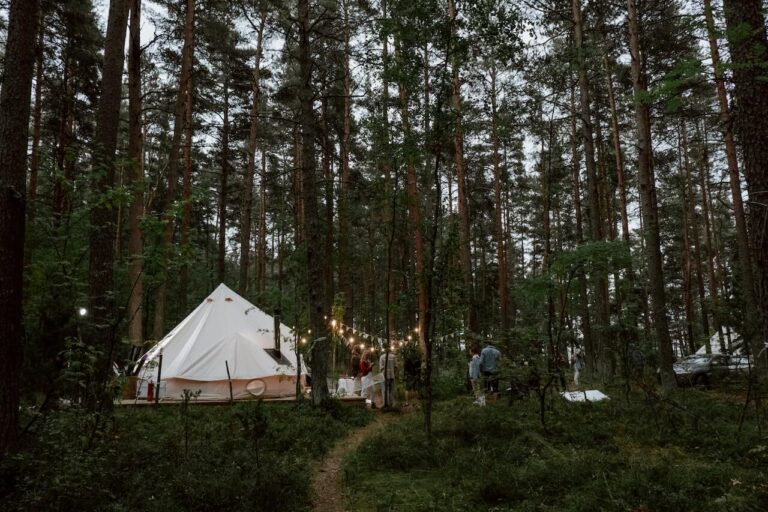
Introduction
If you’re someone who loves spending time outdoors, you’ve likely tried various forms of camping. From pitching a tent to renting a cabin, there are plenty of options available for those who want to experience nature firsthand. However, have you ever considered renting an RV for your next outdoor adventure?
Renting an RV can be a fantastic way to enjoy the great outdoors without sacrificing comfort and convenience. With an RV, you can bring many of the comforts of home with you on your trip, including a comfortable bed, a full kitchen, and even a bathroom.
But what makes renting an RV different from other forms of camping? In this guide, we’ll explore the benefits of renting an RV and why it might be the perfect choice for your next outdoor getaway.

Types of RVs
Before you rent an RV, it’s important to understand the different types of RVs available and the unique features and benefits of each. Here are the most common types of RVs you’ll come across:
- Class A, B, and C Motorhomes: Motorhomes are large, self-contained vehicles that combine the living quarters and driving area into one unit. Class A motorhomes are the largest and most luxurious, while Class B motorhomes (also known as camper vans) are smaller and more maneuverable. Class C motorhomes are a hybrid of the two, with a sleeping area above the driving cab.
- Travel Trailers: Travel trailers are towed by a vehicle and come in a range of sizes and styles. They’re often more affordable than motorhomes and can be unhitched at the campsite, leaving your towing vehicle free to explore.
- Fifth-Wheel Trailers: Similar to travel trailers, fifth-wheel trailers are designed to be towed by a pickup truck with a special hitch. They offer more living space than traditional travel trailers and are often a favorite among full-time RVers.
- Pop-Up Campers: Pop-up campers are small, lightweight trailers that fold down for easy towing and storage. They’re great for those who want a camping experience without the hassle of setting up and tearing down a tent.
Each type of RV has its pros and cons, so it’s important to consider your needs and preferences when choosing which one to rent. For example, if you’re planning to travel long distances or stay in one location for an extended period, a motorhome may be the best choice. On the other hand, if you’re looking for a more affordable option that’s easier to tow, a travel trailer or pop-up camper may be a better fit.

Choosing the Right RV Rental Company
Once you’ve decided on the type of RV you want to rent, it’s important to choose the right rental company. Here are some tips to help you make an informed decision:
- Researching Rental Companies: Start by doing some research online. Look for rental companies that specialize in the type of RV you’re interested in and compare their prices, rental policies, and available amenities. Check out online reviews from previous customers to get an idea of their experiences.
- Important Factors to Consider: When evaluating rental companies, consider these important factors:
- Price: RV rental prices can vary widely depending on the type of RV, time of year, and location. Look for rental companies that offer competitive pricing and transparent rental fees.
- Customer Reviews: Check online reviews to get an idea of other customers’ experiences with the rental company. Look for patterns in the reviews and pay attention to any common complaints or issues.
- Location: Consider the location of the rental company and whether it’s convenient for your travel plans. If you’re planning a long road trip, look for rental companies that allow one-way rentals.
- Included Amenities: Some RV rental companies offer additional amenities, such as bedding, kitchen supplies, and outdoor equipment. Look for rental companies that offer these extras to save money and make your trip more comfortable.
By considering these factors and doing your research, you can choose a rental company that meets your needs and provides a smooth, enjoyable RV rental experience.

Renting and Driving an RV
Renting and driving an RV can be a little intimidating, especially if you’ve never done it before. Here are some important things to know:
• Requirements for renting an RV:
Each RV rental company will have their own requirements for renting an RV. Generally, you will need a valid driver’s license and a credit card to make a reservation. Some companies may also require you to be a certain age or have a certain level of driving experience. Be sure to check with your rental company for their specific requirements.
• RV driving tips and safety precautions:
Driving an RV is different than driving a car or truck. RVs are larger and heavier, and require more space and time to maneuver. Some tips for driving an RV include taking wider turns, giving yourself plenty of space between vehicles, and driving slower than you would in a car. It’s also important to be aware of the RV’s height and weight restrictions, and to avoid low bridges, tunnels, and weight-restricted roads.
• Setting up and breaking down camp:
Setting up and breaking down camp is an important part of RV camping. It’s important to familiarize yourself with your RV’s systems, such as water and electrical hookups, and to know how to properly level and stabilize your RV. Be sure to follow all safety guidelines and procedures, and to properly secure your RV before hitting the road.
By following these tips and precautions, you can help ensure that your RV rental experience is safe and enjoyable. Don’t be afraid to ask questions or seek help if you need it, and always prioritize safety when renting and driving an RV.

5 well-known RV rental companies
1: Cruise America:
Cruise America is a well-established RV rental company that has been in business for over 45 years. They offer a variety of RV types, including Class C motorhomes, truck campers, and travel trailers. They also have a loyalty program that rewards repeat customers with discounts and upgrades. Cruise America has over 130 locations across the United States, making it easy to pick up and drop off your rental.
2: El Monte RV:
El Monte RV is a family-owned RV rental company that has been in business since 1970. They offer a range of RV types, including Class A, B, and C motorhomes, as well as travel trailers and pop-up campers. El Monte RV has over 30 locations across the United States, including several near major airports, which makes renting an RV convenient for travelers.
3: Outdoorsy:
Outdoorsy is a peer-to-peer RV rental platform that connects renters with individual RV owners. They offer a wide range of RV types, including motorhomes, travel trailers, and camper vans. Renting through Outdoorsy can be a good option for those who want to try out different RV types or for those who are looking for a more unique rental experience. Outdoorsy has over 14,000 rental listings across the United States and has a 24/7 customer support team.
4: RVshare:
RVshare is another peer-to-peer RV rental platform that connects renters with individual RV owners. They offer a wide variety of RV types, including Class A, B, and C motorhomes, travel trailers, and pop-up campers. RVshare has over 100,000 rental listings across the United States, making it easy to find an RV rental that meets your needs. They also offer insurance coverage for renters and 24/7 roadside assistance.
5: USA RV Rentals:
USA RV Rentals is a full-service RV rental company that offers a variety of RV types and sizes, including Class A, B, and C motorhomes, travel trailers, and camper vans. They have rental locations across the United States and Canada, making it easy to pick up and drop off your rental in different locations. USA RV Rentals offers a lowest price guarantee and a price match program, which ensures that you’re getting the best possible deal on your rental.
Ultimately, the best RV rental company for you will depend on your individual needs and preferences. Be sure to research each company thoroughly and read customer reviews to find a rental company that offers the RV type you want, at a price you can afford, and with the amenities and services that are important to you.

Planning Your RV Trip
Once you’ve chosen your RV rental company and type of RV, it’s time to start planning your trip. Here are some important things to consider:
• Destination and route planning:
Choose your destination and plan your route accordingly. Consider the length of your trip, your travel preferences, and any specific attractions or activities you want to see or do along the way.
• RV park and campground reservations:
Reserve your RV park and campground spots in advance. Many popular campgrounds fill up quickly, especially during peak travel season, so it’s important to make your reservations early. Keep in mind that some campgrounds may have size restrictions for RVs, so be sure to check before booking.
• Packing and preparing for your trip:
Pack appropriately for your trip. Make a list of essential items you’ll need on your trip, such as bedding, towels, cooking utensils, and camping chairs. Also, be sure to stock up on groceries and other supplies before hitting the road.
In addition to these planning considerations, it’s important to also plan for safety on your RV trip. Be sure to check weather and road conditions, and familiarize yourself with your RV’s safety features and emergency procedures. By planning ahead, you can ensure that your RV trip is safe, enjoyable, and stress-free.

RV Maintenance and Care
Taking care of your RV during your trip is important to ensure that it remains in good condition and functions properly. Here are some tips for RV maintenance and care:
Cleaning and maintaining the RV during your trip:
Regular cleaning and maintenance can help prevent damage to your RV and keep it in good condition. Some basic tasks include wiping down surfaces, cleaning the bathroom and kitchen, and regularly checking and emptying the holding tanks. It’s also important to address any issues as soon as they arise, such as a leaky faucet or malfunctioning appliances.
Returning the RV in good condition:
When you return your RV, it’s important to leave it in the same condition as when you received it. This means cleaning the RV and emptying the holding tanks, as well as reporting any damages or issues that may have occurred during your rental period. Some rental companies may charge additional fees for cleaning or repairs if the RV is not returned in good condition.
By taking care of your RV during your trip and returning it in good condition, you can help ensure that the rental process is smooth and stress-free. Remember to always follow the guidelines and procedures provided by your rental company, and to prioritize safety and cleanliness throughout your trip.

RV Rental Costs and Budgeting
Renting an RV can be a great way to experience the outdoors, but it’s important to understand the costs involved and to budget accordingly. Here are some tips for RV rental costs and budgeting:
Understanding rental fees and additional costs:
Rental fees for RVs can vary widely depending on the type of RV, the rental company, and the time of year. In addition to the rental fee, you may also need to pay for mileage, insurance, and any additional fees or deposits required by the rental company. It’s important to read the rental agreement carefully and to ask questions if you’re unsure about any costs.
Tips for budgeting and saving money on your RV trip:
There are several ways to save money on your RV trip. For example, you can try to travel during off-peak seasons or days of the week to save on rental fees. You can also look for rental companies that offer discounts for longer rental periods or for early booking. Another way to save money is to plan your route carefully and avoid unnecessary driving or toll roads. Finally, you can save money on food and supplies by bringing your own or shopping at discount stores.
By understanding the costs involved and budgeting carefully, you can enjoy your RV trip without breaking the bank. Don’t be afraid to shop around for rental companies and to ask for discounts or promotions, and always prioritize safety and enjoyment over luxury amenities.
Conclusion
Renting an RV can be a fantastic way to experience the great outdoors, but it requires careful planning and consideration to ensure a safe, enjoyable, and cost-effective trip. By choosing the right RV rental company, carefully planning your route and destination, and following proper maintenance and safety procedures, you can create unforgettable memories on your next outdoor adventure.
Remember to prioritize safety, cleanliness, and respect for the environment and fellow campers, and to take advantage of the many benefits of RV camping, including flexibility, comfort, and convenience. With the right mindset and preparation, an RV rental can be the perfect way to escape the hustle and bustle of everyday life and connect with nature on your terms.
Read more articles here.





